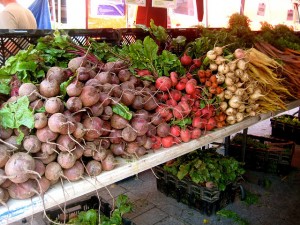Study at Federal Urdu University of Arts, Science and Technology found toxic metals in root vegetables
Thursday, October 27th, 2011 7:18:40 by Zeeshan Gohar
Study at Federal Urdu University of Arts, Science and Technology found toxic metals in root vegetables
Chemistry department of Federal Urdu University of Arts, Science and Technology conducted the research on the vegetables which are being grown and sold in certain parts of the city of
Karachi. The research project was led by Dr. Kousar Yasmeen under the supervision of Dr. Qamrul Haq and Dr. Mohammad Ali Versiani.
Dr. Kousar Yasmeen is currently teaching at the university and has done PhD on the basis of her research and findings of the study have been extracted after a three-year research work
on the vegetables. According to the conclusion of this research, vegetables in Karachi city contain very high levels of toxic metal content like lead, iron, copper and cadmium which can pose a serious health risk to consumers.
The researchers took samples of radish, beet, turnip, carrot, potato and sweet potato and their leaves from S.I.T.E (Shershah), Malir and Empress Market in Saddar for three years. The
vegetables collected from here were irrigated with the Indus River supply or industrial effluents which are affected by Industrial Waste. The study have also found elevated levels of metal contamination in tap water.
The samples taken were examined to trace contents of metals such as cadmium, nickel, chromium, iron, copper, manganese, lead and zinc. The researchers also tested the samples of sand,
industrial wastewater and tap water to ascertain the level of total dissolved salts, acidity, alkalinity, sulphate, hardness, chloride, biological oxygen demand, dissolved oxygen, chemical oxygen demand and trace metal contents.
The research found out that the concentration of all metals, except zinc, crossed the threshold limits in all samples of root vegetables irrigated with industrial wastewater, however,
they are comparatively less in those collected from Empress Market in Saddar. As far as the root vegetables and the soil irrigated with industrial wastewater in Malir had elevated levels of cobalt, chromium, manganese, cadmium, iron, copper and nickel.
Radish and beet leaves had the maximum concentration of iron, 0.875 ppm (parts per million) in 2007, 0.932 ppm in 2008 in radish leaves and 1.957 ppm in beet leaves in 2009. The wastewater
and tp waters samples also had higher concentration of metals exceeding the WHO permissible limits. The tap water samples of Gulshan-i-Iqbal had an average concentration of metals, 3.279ppm (2007), 3.890ppm (2008) and 5.090ppm (2009).
The research results showed that there is a linear correlation within free metal availability in water source, soil composition and its metal retention and exchange capacity and the selective
absorption behaviour of vegetables.
According to Dr. Kousar Yasmeen, as she spoke to Dawn, “The concentration level of metals showed an increase in water, sand and vegetable samples over the past three years as the levels
of oxygen dropped. The metal contamination was seen more in vegetables that grow under the soil.”
She added that the relation between various diseases and contaminated food chain is well recognized and it needs an awareness as well as action on part of the government to discourage
the use of industrial wastewater for cultivation.
Short URL: https://www.newspakistan.pk/?p=1717

















